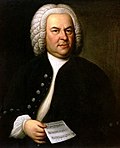Goldberg Variations
The Goldberg Variations (BWV 988) is a work for keyboard by Johann Sebastian Bach. It was written about 1741. The work consists of an aria and thirty variations. The aria was not original with Bach, but was probably based on a now lost French dance tune. The work is believed to have been commissioned by a pupil of Bach's named J. G. Goldberg. Goldberg was a celebrated virtuoso, and used the work to lull his insomniac employer Count Keyserkingk to sleep.[1]
The basic harmonies and structure of the aria remain consistent from variation to variation. The work ends with a quodlibet, a humorous combination of two popular tunes. John Keillor writes, "The work is sublime and compassionate, graceful, warm, and relentlessly intricate, a demonstration of unmatched craft in music history and genuine, poetic imagination." In modern times, the work is played on both the harpsichord and the piano.
Other editions
Later composers made adaptations of Bach's work. Among them, Josef Gabriel Rheinberger arranged a version for two pianos in the years 1880-1885. His idea was to change the work so that it could be played for a small audience in the host's home. This required major changes. In 1913, Max Reger revised this edition. He added indications on how it shood be played, and at what speed. In 1914, Ferruccio Busoni also revised the work, but he intended for it to be played in concert. He stated that it should be shortened, and that several repetitions were unnecessary.
Goldberg Variations Media
Notes
- ↑ Woodstra, p. 47
References
- Woodstra, Chris, et. al. 2005. All Music Guide to Classical Music. All Music Guide, LLC. ISBN 0-87930-865-6.
